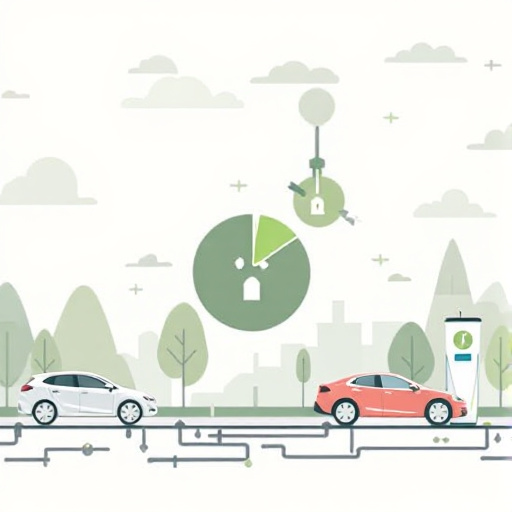Related Articles
- Charged Up! How Electric Vehicles are Reshaping Urban Wildlife Habitats and Biodiversity
- Navigating the Used Car Market: Uncovering the Secrets of 'As-Is' Sales for Savvy Buyers
- The Rise of Electric Car Pop-up Shops: A New Frontier for Urban Retail Experiences
- The Forgotten Art of DIY Car Maintenance: Rediscovering Skills in a Tech-Driven World
- Electric vs. Vintage: The Battle for Enthusiasts' Hearts in the Age of Latest Car Models
- The Rise of the 'Car Review Influencer': How Social Media is Shaping Auto Buying Decisions
Unlocking the Secrets: How Climate Change is Shaping Your Next Car Purchase Choices
Unlocking the Secrets: How Climate Change is Shaping Your Next Car Purchase Choices
As climate change looms larger on our societal landscape, it’s becoming increasingly vital that we factor its impacts into our car purchasing decisions. From electric vehicles (EVs) to fuel efficiency ratings, understanding how climate-related dynamics shape automotive choices is essential for today’s eco-conscious consumer.
Understanding the Climate Change Context
According to NASA, 97% of climate scientists agree that global warming is largely caused by human activities (NASA, 2023). This sobering statistic underscores the need for change—not just in policies but in our personal choices. The automobile industry is a significant contributor to greenhouse gas emissions, with passenger vehicles accounting for about 15% of total emissions in the U.S. (EPA, 2022). When it comes to purchasing a car, these truths weigh heavily on the decisions of potential buyers.
What’s Driving the Change: EVs vs. Traditional Cars
Imagine it’s a sunny Saturday morning, and you’re walking down a street lined with the latest car models. You’d hardly believe that a decade ago, the mere concept of an electric vehicle (EV) was met with skepticism. Fast forward to today, and EVs are becoming increasingly mainstream, thanks to advancing technology and heightened environmental awareness.
Take a cue from Tesla, an early champion of electric vehicles. Their innovative approach has catalyzed an entire industry shift. By 2020, electric cars made up 2% of all new car sales in the U.S., and by mid-2023, that number skyrocketed to over 25% (Edmunds, 2023). Now, who wouldn’t want to hop on that electric bandwagon?
Financial Considerations: The Economic Angle
One might argue: "Electric cars are just too damn expensive!" Fair point—but hold your horses (or, in this case, your horsepower). Many federal and state incentives are available to offset the initial purchase cost of EVs. For instance, the federal government offers tax credits of up to $7,500 for eligible electric vehicles (IRS, 2023). In some states, there are additional rebates that can significantly lower your overall expenditure, making those zero-emission cars much more appealing.
Moreover, consider the long-term savings on fuel. With gas prices fluctuating wildly, charging your EV is generally cheaper. Depending on how often you drive, you could save hundreds to thousands of dollars each year just on fuel costs alone.
Eco-Consciousness: The Psychological Shift
Ever walk into a party and notice someone holding a drink that looks a little too green? That’s the vibe nowadays—unabashedly eco-conscious. The Millennial and Gen Z populations are particularly keen on living sustainably, and that sentiment spills into their purchasing habits.
It’s not just about saving the planet; there’s a social element here too. A recent study revealed that over 70% of younger consumers would likely prefer an eco-friendly car choice because it more accurately reflects their values (McKinsey, 2023). Buying green is now a status symbol—showing off that shiny new Tesla is not just cool; it’s an embodiment of your values.
Personal Stories: The Impact of Climate Change on Choices
On a rainy evening, let’s say Sarah, a 29-year-old teacher, found herself pondering her next vehicle. “Should I go for a fuel-efficient sedan, or should I just join the EV party?” she thought. The tipping point came when she learned that driving an average gasoline car emits nearly 4.6 metric tons of CO2 per year, while electric vehicles can significantly reduce her carbon footprint (EPA, 2022). That feeling of driving towards a cleaner future tugged at her heartstrings, and she soon found herself in the driver’s seat of a coveted EV.
Conversely, an older buyer, Tom, 65, weighed the options from a different perspective. For him, traditional cars—those roaring beasts with rumbling engines—had always been a staple. However, the rising concern about climate change eventually transformed Tom’s thinking. After a neighbor raved about the savings on their monthly electric bill after switching to an electric car, Tom saw not just the environmental game-changer but also a pathway for his retirement savings. “If I can cut down my spending, why not?!” he chuckled. "Plus, it’s nice to be part of the solution."
Fuel Efficiency: The Unsung Hero
For many, fuel efficiency proves to be the golden ticket when swapping their old car for a new one. Prioritizing fuel economy aligns not only with saving money but also reduces overall carbon emissions. Cars with excellent gas mileage can lead to one less trip to the pump and one less reason to frown at fluctuating gas prices.
According to the U.S. Department of Energy, switching from a car that gets 20 mpg to one that gets 30 mpg can save nearly $500 a year in fuel costs, and that’s over 10 years (DOE, 2023). When you frame it that way, that next purchase decision suddenly feels less daunting and more exciting.
The Role of Policy: How Government Shapes Choices
Believe it or not, your government plays an integral role in influencing your car-buying choices. Policies aimed at reducing carbon emissions have transformed the offerings in the automotive market. In 2022, the U.S. proposed a plan to have at least 50% of new vehicles sold to be electric by 2030 (Biden Administration, 2022). This initiative nudges car manufacturers to innovate and pushes consumers to consider alternatives to rising gasoline prices.
Additionally, cities are introducing bans on the sale of new gasoline-fueled vehicles by 2035. What does this mean for you? If you plan to keep your vehicle for the long haul, you might be looking at a dramatically different automotive landscape as you enter the dealership in a few years. Ignoring these changes is akin to peddling backward on a bike—inefficient and puzzling.
Adapting to the Future: Short and Long-Term Trends
Technology is racing to create more sustainable automotive solutions, including hydrogen fuel and advancements in battery technology. In 2022 alone, investments in EV startups surged to around $30 billion, paving the way for innovation that will redefine transportation (Business Insider, 2023). This ongoing evolution signals that today's car market is merely a precursor to tomorrow's opportunities.
So, what are the trends to watch out for? Get ready for more hybrid cars hitting the market, where you can benefit from both electric and traditional fuel options. Then there are the new, shiny automakers like Rivian and Lucid, who are upping the game in the luxury electric car sector. When making your choices today, consider how you can meet future environmental expectations without sacrificing comfort.
The Power of Choice: Your Impact Matters
At the end of the day, whether you're concerned about the environment, the economy, or simply the price of gas, the choice rests in your hands. Each decision you make ripples through the auto industry, prompting innovation and change.
The greenhouse gases emitted from the vehicles we choose today will linger in the atmosphere tomorrow. Your next car purchase could not only lead to personal savings but also contribute to collective efforts to combat climate change.
Conclusion: A Transformative Journey
As we wrap up, feel empowered to become an eco-conscious consumer. Your choices don’t just affect you; they play a part in shaping a more sustainable future for all. With myriad options from luxurious EVs to fuel-efficient gas savers, the automobile landscape is changing, and it’s doing so fast. So buckle up; it’s going to be a thrilling ride on the road to sustainability!




